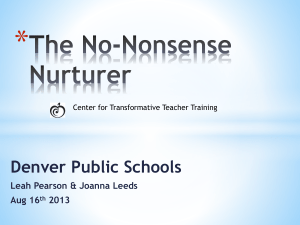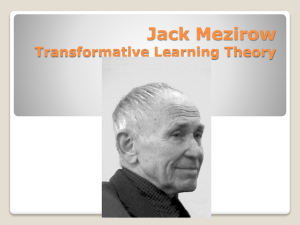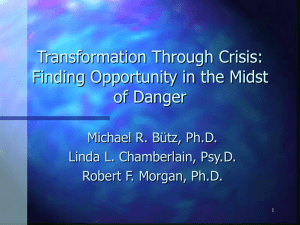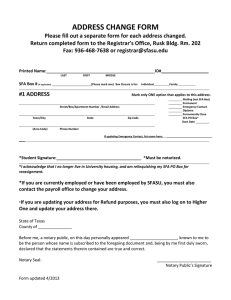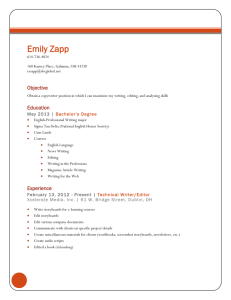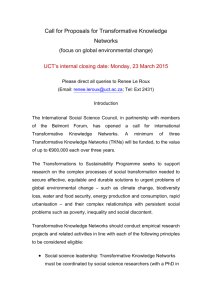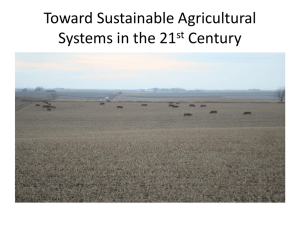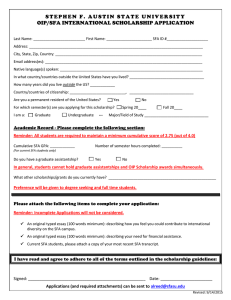Concept Paper Transformative Experiences For Students
advertisement
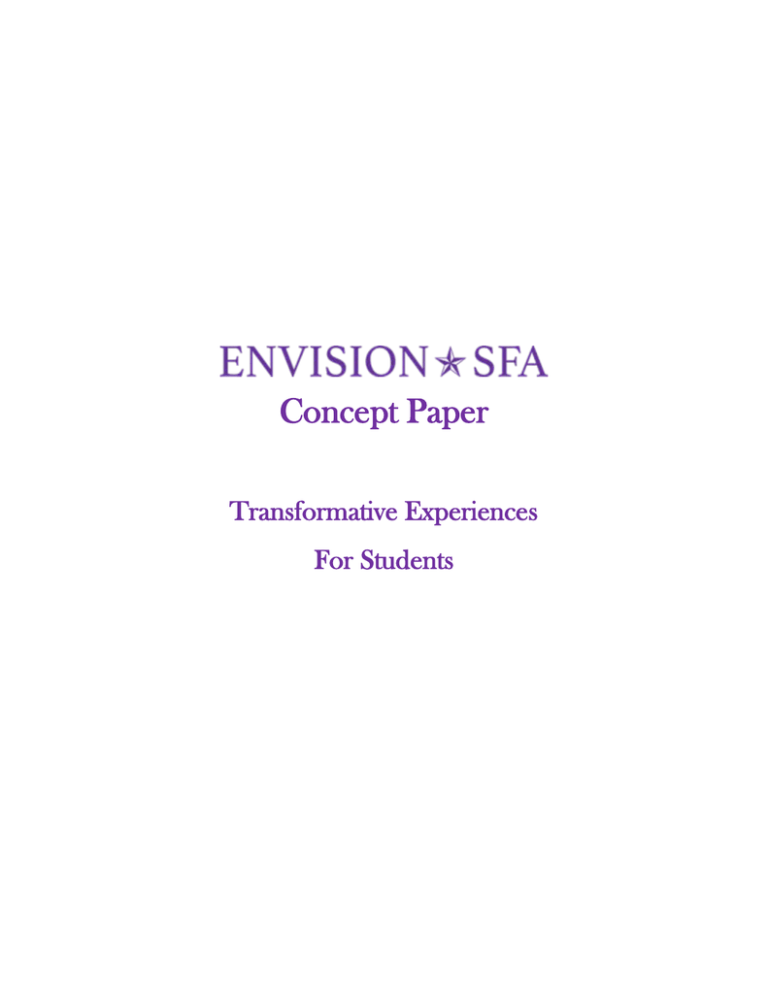
Concept Paper Transformative Experiences For Students 1 Envision SFA Concept Paper: Provide Transformative Experiences for Students Background SFA is a regional, comprehensive, state university, and the literature indicates that the role of such universities is to focus on helping students meet their personal and vocational goals by providing experiences that are transformative. SFA must provide learning opportunities that help students succeed not only in the classroom, but which adequately prepare them for success in life. There is good reason to believe that we have some areas which do this quite well, but this should be a campus-wide, collaborative and integrative effort. We should also determine how to ensure that we put our resources into programs which meet these goals, ensure students know about the availability of these experiences and that we provide “coherent pathways” to accessing these programs (Tinto, 2012, p. 115). If we are successful in pursuing this goal, our ability to help students meet the challenges of the world beyond college would be significantly enhanced. This concept paper will discuss the experiences we currently have in place, and how we can pursue the goal of integration and communication of these experiences. High Impact Practice Experiences One promising practice that has a growing body of empirical support is a group of teaching techniques called “High Impact Experiences.” SFA adopted a focus on “High Impact Experiences” as our Quality Enhancement Plan during our most recent reaffirmation of accreditation through the Southern Association of Colleges and Schools (SACS). Ensuring that the program has made a demonstrated impact will be important to success in our upcoming interim report to SACS, but beyond that, successful widespread implementation can make a tremendous impact for our students. For example, a leading researcher on High Impact Practices, George Kuh has found that students who are exposed to two high impact experiences during their college years will often outperform their peers who do not have these experiences (even if their peers are at significantly less risk). There are a wide variety of programs that are suitable for high impact practices. These are listed in Kuh (2008): First-Year Seminars and Experiences First-year seminars bring small groups of students together with faculty or staff on a regular basis. The highest-quality first-year experiences place a strong emphasis on critical inquiry, frequent writing, information literacy, collaborative learning, and other skills that develop students’ intellectual and practical competencies. Common Intellectual Experiences These programs often combine broad themes—e.g., technology and society, global interdependence—with a variety of curricular and co-curricular options for students. 2 Learning Communities The key goals for learning communities are to encourage integration of learning across courses and to involve students with “big questions” that matter beyond the classroom. Writing-Intensive Courses These courses emphasize writing at all levels of instruction and across the curriculum, including final-year projects. Collaborative Assignments and Projects Approaches range from study groups within a course, to team-based assignments and writing, to cooperative projects and research. Undergraduate Research Many colleges and universities are now providing research experiences for students in all disciplines. The goal is to involve students with actively contested questions, empirical observation, cutting-edge technologies, and the sense of excitement that comes from working to answer important questions. Diversity/Global Learning Many colleges and universities now emphasize courses and programs that help students explore cultures, life experiences, and worldviews different from their own. Frequently, intercultural studies are augmented by experiential learning in the community and/or by study abroad. Service Learning, Community-Based Learning In these programs, field-based “experiential learning” with community partners is an instructional strategy—and often a required part of the course. These programs model the idea that giving something back to the community is an important college outcome, and that working with community partners is good preparation for citizenship, work, and life. Internships Internships are another increasingly common form of experiential learning. The idea is to provide students with direct experience in a work setting—usually related to their career interests—and to give them the benefit of supervision and coaching from professionals in the field. Capstone Courses and Projects Whether they’re called “senior capstones” or some other name, these culminating experiences require students nearing the end of their college years to create a project of some sort that integrates and applies what they’ve learned. 3 Transformative Learning through Life Skills Development As we learned from our Strategic Plan focus groups, as well as best practice authors in Higher Education, what students need to get from their time in college is “real world” experience. This takes form in many ways and from many different experiences but most commonly refers to the two key areas of Life Skills and Career Readiness Skills. If these are learned then a student’s time at college can be a truly “transformative experience” and prepare them for successful lives and careers. SFA takes pride in promoting diverse transformative learning activities designed to expand the student’s understanding of themselves, others and the world based on their social interactions occurring within the environment. At SFA, students commonly report that exposure to new information lead to a paradigm shift in their perspectives and place them in a better position to think critically about how the information learned applies to themselves or others. The experience of learning new content is transformative in nature since the new information potentially alters how the learner previously made meaning of the world. SFA faculty members produce transformative learning experiences by intentionally creating a host of learning activities that focuses on the development of life skills through facilitating interactive and innovative learning activities. Other areas such as Student Affairs contribute in this area through various program offerings. These experiences emphasize the development of leadership skills, promote positive collaboration with others from diverse backgrounds, improve communications skills in both oral and written forms, increase problem solving and decision making skills and to ensure that the mastery of course content efficiently transfer over into the employment setting. The term life skills generally refer to a set of personal traits and abilities that allows an individual to effectively contend with variety of human experiences throughout one’s lifespan. The Department of Education (DEA) provided an operational definition that defines life skills as including self-development of individualized characteristics, communication skills, employment and financial management, interpersonal and family relationships, and stress and anger management skills (DEA, 2014). For the purpose of this content paper, the DEA definition is drawn upon as the foundation to explain life skills development processes within the context of transformative learning experiences mediating growth and change over time. Transformative Learning through Career Readiness Skill Development With regard to Career Readiness Skills, much can be learned from prospective employers. According to NACE (National Association of Colleges and Employers) the top skills and qualities that employers are looking for are the ability to verbally communicate with person’s inside and outside the organization; the ability to work in a team structure; the ability to make decisions and solve problems; the ability to plan, organize, and prioritize work; and the ability to obtain and process information. Other skills round out the list but these seem to rise to the top when looking at multiple sources including the Association of American Colleges and Universities who cite similar skills as most needed and add written communication skills to the top of the list. These key skills are learned best from a variety of formats and colleges should be providing as many of these learning opportunities as possible. Some are learned in the classroom while others are best learned through other means. According to the Chronicle of Higher Education the experiences employers consider most important in hiring are things such as 4 internships, employment during college, volunteering, and extracurricular activities above other traditional things such as GPA and college reputation. These sources mirror what SFA has heard from many focus groups. As an institution we provide many opportunities for students to learn these types of skills in order to be career ready and marketable, but more needs to be done. As we heard from local business leaders, many of our students lack the “polish” needed to obtain a job with them even though they may have many of the hard skills. An inventory of current programs should be done to see where we have gaps or overlaps in providing scholar/practitioner opportunities and more emphasis placed on marketing these opportunities to students. Lessons Learned In reviewing the efforts at providing transformative experiences that have been utilized at SFA, we have found that the courses and activities designed to contribute to transformational learning have been generally successful but we need more of them. There are a variety of programs that provide opportunities for transformational learning; however, the area in which we appear to be weakest is proper preparation for professional interactions. Communication skills, workplace protocol, and the transformation from student to professional are areas where we can seek to improve. National Trends in Higher Education A Gallup survey conducted on behalf of the Lumina Foundation found that only 11% of business leaders and only 14% of the general public felt strongly that students graduated from college with the skills and competencies that are needed for success in the workplace (Lumina, 2013). In another study, Hart Research Associates interviewed 302 employers whose organizations have at least 25 employees with at least a 25% holding a two or four year credential. A majority of respondents expressed that both two- and four-year colleges need to make at least some improvements to prepare students for the global economy (Hart Research Associates, 2010). Clearly employers and the general public have lost confidence in the ability of colleges and universities to prepare students for the world of work. There is a growing trend of trying to address this lack of public confidence using measures intended to “hold institutions accountable” for these students’ success. Many have bemoaned the shift in accountability for student success from the students themselves to the institutions they attend. However, it does not appear that this argument is impacting the march toward increased accountability as seen by initiatives in other states. Additionally, as mentioned previously, it is the mission of institutions such as SFA to help students transform their lives. For many reasons, we need to seek out best practices that help students obtain career skills that can help students find work after graduation. Strategic Themes for the Future ● While SFA has a large number of transformative experiences, these can be difficult for students to know about and navigate. ● While we believe that our programs and services are effective, they could be made more so by connecting and integrating them with each other 5 ● We need to develop strategies for informing disengaged students about the programs and services that can assist them in academic success, developing life skills and promoting career readiness. ● Strategies for academic success, developing life skills and promoting career readiness should be embedded in the curriculum and promoted throughout co-curricular experiences. Short- and Long-Term Plans ● Develop strategies within Academic Affairs and University Affairs to integrate existing and new programs to strengthen transformative experiences and ensure that they are campus-wide, collaborative and integrative. ● Encourage, recognize, and reward faculty and staff for providing transformative learning. ● Distinguish or notate classes and co-curricular experiences that offer transformative learning in the curriculum and track university goals for transformative learning opportunities. ● Increase visibility and awareness of transformational learning opportunities to internal and external stakeholders. ● Provide opportunities inside and outside the classroom for students to continue to develop life skills and to be able to articulate and demonstrate those skills when needed. ● Emphasize on-campus employment opportunities as an avenue to develop career and life skills. ● Develop a comprehensive plan to infuse career development into all four years of the student experience. ● Study and make recommendations regarding staffing and financial resources in Career Services. ● Develop a plan to ensure that students are provided the opportunity to engage in one high impact experience in their first year at SFA and at least one other high impact experience connected to their major. ● Ensure that programs implement training prior to internships and practical experiences. ● Assess post-graduation impact of transformative experiences on employment rates and career readiness. Projected Investment It would be very difficult to forecast actual costs associated with each of these projects because they are at a very early stage.
